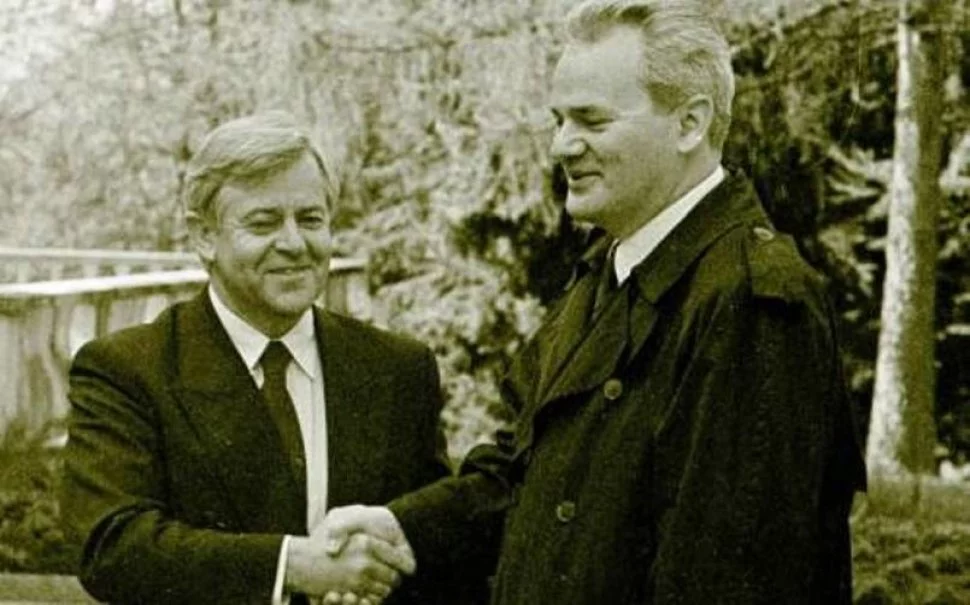New horrifying details are coming to light about the friendship of the last leader of the League of Communists, Milan Kučan, with the tyrant Slobodan Milošević. Kučan admitted that he was sorry when Milošević found himself in the Hague Tribunal for crimes against humanity. In relation to this, the Croatian economist and sociologist Slaven Letica pointed out the so-called Secret Agreement between Kučan and Milošević, which was to the detriment of the other Yugoslav nations. The agreement was supposed to legalise the self-determination of the Yugoslav nations (not the republics!) and thus widely open the doors to the aspirations of Greater Serbia. Kučan therefore indirectly participated in the ethnic cleansing in the Balkans. He also participated in the sale of weapons to Croatia, and the later creation of “arms affairs” was intended only for domestic political reckoning.
As the former Party leader Milan Kučan also admitted, seeing a man whom he worked with for years, in the Hague, who was later also accused of the most serious crimes against humanity, was not easy for him. As he further admitted, Milošević was a pragmatic man, but he was seduced by his desire for authority. He knew the Serbian war criminal from the times when he was still engaged in banking and a little later from the period when he was part of the leadership of the Belgrade Communist Party. In addition to being a pragmatic man, he was also a man with no political agenda. During this time, the Memorandum of the Serbian Academy of Sciences and Arts (commonly referred to as the SANU Memorandum) appeared – the political programme that was supposed to reposition Serbia within the Socialist Federal Republic of Yugoslavia. This was a programme that emerged in academic circles without actual organisational action capabilities.
At the same time, the two components were merged, and the concept of a Greater Serbia, or Serbia, which would territorially unite all areas where Serbs live, was revived. Kučan presented his views on this for the newspaper Nedeljnik. The last head of the League of Communists noticed at the end of the 1980s already, at a meeting in Kosovo Polje, that Milošević had adopted a nationalist way of thinking. At the time, Kučan also emphasised that a person’s true character is only revealed after they get into a position of power and get money. He believes that Milošević was drunk on power and that in the course of his involvement in politics, he became a different man than who Kučan had known until then.
In 2013, on a show called Reflex, professor, economist, sociologist, and politician from Zagreb, Slaven Letica, and Bosnian journalist Esad Hečimović, highlighted Kučan’s secret meeting with Milošević, at which an agreement was reached on the self-determination of nations (not republics!), which was favourable for the Slovenian and Serbian side, but detrimental to the rest of the Yugoslav peoples, because it was supposed to open the door to the idea of a Greater Serbia and the aspirations to unite all Serbians in a common state, thus giving free rein to the ethnic cleansing that followed in Croatia and especially Bosnia and Herzegovina, where the key to the self-determination, due to the unclear ethnic boundaries, became a weapon. That is why the question of Kučan’s inevitably truthfulness arises regarding his statement, in which he said that he felt sorry for Milošević after he wound up at the Hague Tribunal for the most heinous crimes against humanity. Did Kučan not understand what he agreed to with the secret agreement?
In this context, it is therefore pointless to demonise the sale of the Slovenian weapons (which was intended for the self-defence of the nations) and to create the arms affairs (especially if this is being done by Kučan and his circles). With his pact and the consequent support for the military intervention, Kučan supposedly triggered the need for arms. The subsequent “arms affairs” arose solely for the purpose of internal political reckoning with the competition. The aforementioned show Reflex also mentions a secret session of the Slovenian Presidency, which took place on the 26th of August 1991, and was attended by: Milan Kučan, Ciril Zlobec, Matija Kmecl, Dušan Plut, Lojze Peterle, Igor Bavčar, Dimitrij Rupel, Janez Janša and Jelko Kacin. The participants agreed at the meeting that it was necessary to start selling weapons in order to help Croatia in its self-defence. The matter, however, was semi-illegal because it would constitute a violation of the UN embargo.
The renowned Slovenian diplomat Dimitrij Rupel recently wrote the following about the Kučan-Miloševič meeting and their secret pact: “In addition to Galić, others also wrote about the meeting between the Serbian and Slovenian friends/politicians in Belgrade on the 14th of August 1991, including two of the attendees of the meeting, Ćisić and Rupel, Slaven Letica and Slovenian historian Božo Repe. A copy of the minutes was (as can be seen from the appendix) also handed over to the then-president Milan Kučan, but he and his authorised interpreter Repe are denying this. In an interview for Mladina, Repe states: ‘Kučan did not know about the meeting described by Rupel and Ćosić.’”
Domen Mezeg


